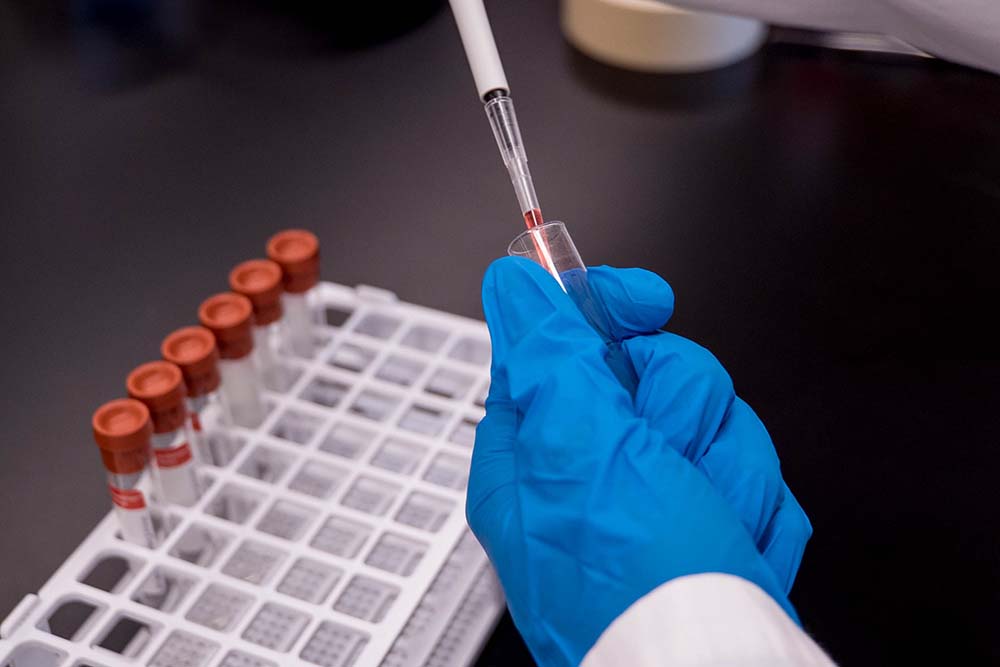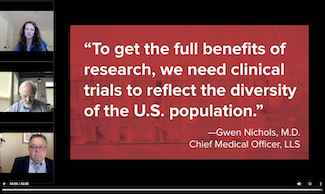
- Details
- By Native News Online/Marketing Staff
Across the country, more people than ever are surviving their battles with cancer, owing to the incredible advancements in technology and therapies.
Yet at the same time, death rates have increased among American Indian and Alaskan Native (AI/AN) cancer patients over the past 20 years.
One of the most effective ways to reduce the current trend: clinical trials.
|
You can watch the webinar video below or by visiting YouTube. If you or someone you know needs information or assistance related to blood cancers, you can talk to an LLS Information Speciality or Clinical Trial Nurse Navigator by calling 800-955-4572 between 9 a.m. and 9 p.m. (Eastern Time) or by emailing [email protected]. |
That was the message of a recent webinar, hosted by Native News Online and The Leukemia & Lymphoma Society (LLS) regarding the importance of clinical trials among those in Indian Country. Despite advancements in cancer therapies, participation in clinical trials often lack the diversity required to reflect a true sampling of the population.
“There’s a high level of hesitancy among Native people to participate in clinical trials,” said Native News Online Publisher Levi Rickert (Prairie Band Potawatomi). “But it’s important to recognize that American Indian and Alaska Native people need to be represented when they’re running trials to create new drugs and new treatments.”
Overall, Native American and Alaskan Natives comprise a small fraction of those participating in clinical trials, said Laura Romunstad, a nurse practitioner with LLS.
“That’s not reflective of our population,” Romunstad said during the webinar. “The goal is to increase participation from our minority participants and allow them to have a voice moving these cancer treatments forward.”
Those survival rates from cancer are declining across Indian Country, medical professionals believe a wider representation of Indigenous people in clinical trials would help develop more powerful therapies. Doctors and scientists need to draw data from clinical trials based on a wide range of individuals, Romunstad said.
Therapies perform differently for each person. While one may be effective in one ethnic group, genetic factors can make the therapy less effective for another. Side effects can also vary widely depending on the background of the person involved in the treatment, Romunstad said.
Dispelling Myths
The decision to avoid clinical trials comes down to the individual, however, many Indigenous people harbor long-standing and historic distrust of the medical system, Rickert said. They also face systemic barriers including poor access to healthcare and programs, and underfunded urban or tribal health systems.
Many avoid clinical trials out of fear of being treated as guinea pigs, Romunstad said, noting the clinical trials are often looked at as medical experiments. However, this perception is far from reality, she said. Clinical trials take years to develop, test and refine before they are allowed to be used on people. Even after the treatments are ready, they must pass the stringent standards of the Federal Food and Drug Administration before being accepted as clinical trials. All trials are also overseen by the Institutional Review Board (IRB), which is dedicated to the human rights of clinical trial participants.
Others avoid clinical trials because they think they are only available for those individuals who have exhausted all other treatment options. However, Romunstad noted that people are allowed to participate in clinical trials during any phase of their treatment process.
Going forward, LLS plans to increase accessibility to clinical trials and ease some of the systemic barriers keeping Native Americans and Alaskan Natives from participating in the programs. For one, the organization is leveraging funds through the Affordable Care Act which provided additional Medicare funding for routine expenses incurred when participating in clinical trials. LLS is also working to ease the eligibility requirements to enroll in trials, specifically around comorbidities – additional diseases present during treatment.
Overall, Romunstad believes that increased participation rates by Indigenous people in clinical trials will help increase the effectiveness of cancer treatments, for them, their loved ones and communities going forward.
“People are living longer and that’s a result of these successful clinical trials and treatments that are coming from those trials,” Romunstad said “We are trending toward less toxic therapies and toward more targeted therapies and medicine to improve both the quantity and quality of life that people are saying.”
Native News Online’s Rickert pointed out that Indigenous participation in clinical trials isn’t just for the patient — it’s for the tribal community and all of Indian Country.
“I think that’s huge,” he said, “because community is very important for Native people.”
For more information, visit lls.org.
Help us defend tribal sovereignty.
At Native News Online, our mission is rooted in telling the stories that strengthen sovereignty and uplift Indigenous voices — not just at year’s end, but every single day.
Because of your generosity last year, we were able to keep our reporters on the ground in tribal communities, at national gatherings and in the halls of Congress — covering the issues that matter most to Indian Country: sovereignty, culture, education, health and economic opportunity.
That support sustained us through a tough year in 2025. Now, as we look to the year ahead, we need your help right now to ensure warrior journalism remains strong — reporting that defends tribal sovereignty, amplifies Native truth, and holds power accountable.
 The stakes couldn't be higher. Your support keeps Native voices heard, Native stories told and Native sovereignty defended.
The stakes couldn't be higher. Your support keeps Native voices heard, Native stories told and Native sovereignty defended.
Stand with Warrior Journalism today.
Levi Rickert (Potawatomi), Editor & Publisher

